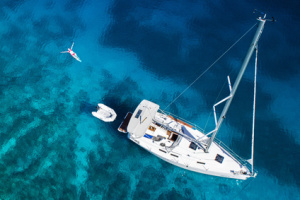Florida Legislation
 The greatest number of maritime accidents occurs in the State of Florida. Under any circumstances, boat accidents happen because people do not really understand, or underestimate, the inherent dangers of navigating through the water.
The greatest number of maritime accidents occurs in the State of Florida. Under any circumstances, boat accidents happen because people do not really understand, or underestimate, the inherent dangers of navigating through the water.
It is most unfortunate that the relevant laws in Florida do not impose any restrictions in regards to the age or yachting or boating knowledge and experience of the individuals who operate boats or yachts. This allows for anyone to stand behind the helm and navigate without even knowing how to do so. It is vital for the person to know the capabilities and limitations of the watercraft they operate, and the route to take in case of a storm or other such issues. Furthermore, basic safety rules such as wearing life jackets or installing switches to turn off the engine in the case of the helmsman taken off his station are also often ignored.
Florida law requires the examination of maritime accidents through the nautical regulation known as “the Rules of the Road”, which takes into account if a personal injury or death occurred, and if the claimant was either employed or just a guest of the boat owner or operator. It also takes into consideration whether there was reasonable ground to assume that the owner or operator can be held liable.
What kind of crafts are involved?
To handle a claim as a boat accident, it has to occur on board:
- Jet skis
- Wave runners
- Center console runabouts
- Yachts
- Cabin cruisers
- Inflatable boats either collapsible or semi-rigid
- Tenders
- Sailboats
- Airboats
- Kayaks
- Canoes
- Paddleboards
- Pedalos
- Go-fast boats
Applicable situations
It is a completely false belief that any person who boards a boat automatically accepts all the risks attached to the activity. A boat owner or operator can be held responsible for any act of negligence that caused personal injuries or death to either the occupants of their vessel or to another vessel in the cases of:
- Hitting waves or wakes at unsafe speeds or angles
- Occupant ejection from the boat due to wrongful operation or a decision to navigate the vessel through heavy weather
- Occupant contact with the propeller(s)
- Cruising at high speed
- Failure to pay attention to an occupant when they are skiing or tubing
- Failure to comply with the navigational rules
- Collisions with other vessels
- Overloading the vessel
- Overcrowding the vessel
- Impacts with stationary objects like navigational aids, piers or bridges
Should any of the aforementioned be the basis of the claim, the plaintiff is entitled to compensations for medical bills, lost wages and all pain and suffering that came as a result of the accident.
But it should be made perfectly clear that the maritime laws are completely different from the land based laws and therefore it is imperative that attorneys like Singer & O’Neil, who are well versed in maritime subjects, are selected.
